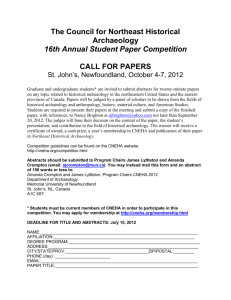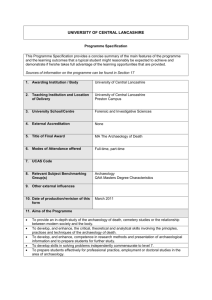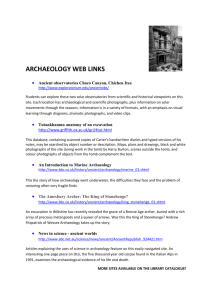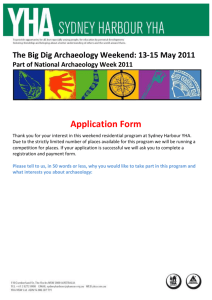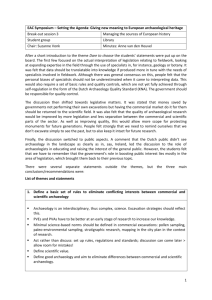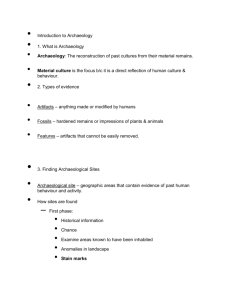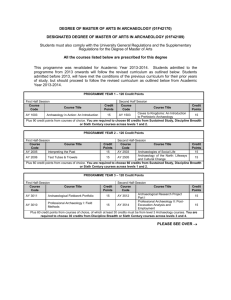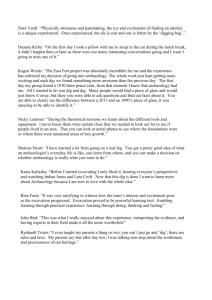ma_archaeology - University of Central Lancashire
advertisement
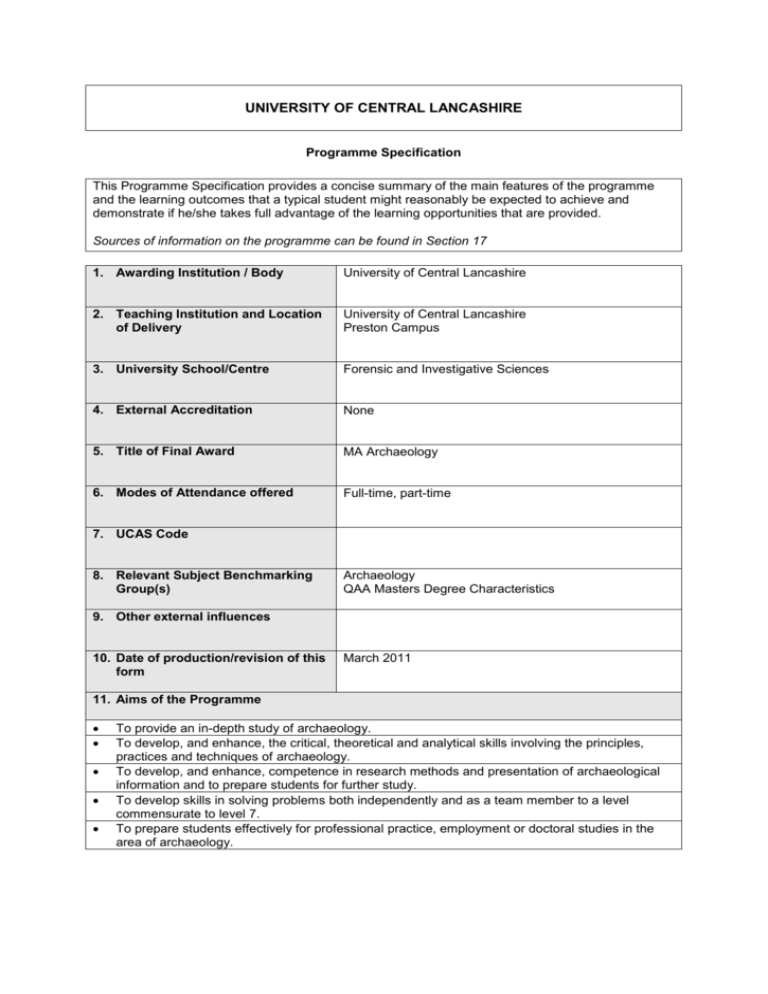
UNIVERSITY OF CENTRAL LANCASHIRE Programme Specification This Programme Specification provides a concise summary of the main features of the programme and the learning outcomes that a typical student might reasonably be expected to achieve and demonstrate if he/she takes full advantage of the learning opportunities that are provided. Sources of information on the programme can be found in Section 17 1. Awarding Institution / Body University of Central Lancashire 2. Teaching Institution and Location of Delivery University of Central Lancashire Preston Campus 3. University School/Centre Forensic and Investigative Sciences 4. External Accreditation None 5. Title of Final Award MA Archaeology 6. Modes of Attendance offered Full-time, part-time 7. UCAS Code 8. Relevant Subject Benchmarking Group(s) Archaeology QAA Masters Degree Characteristics 9. Other external influences 10. Date of production/revision of this form March 2011 11. Aims of the Programme To provide an in-depth study of archaeology. To develop, and enhance, the critical, theoretical and analytical skills involving the principles, practices and techniques of archaeology. To develop, and enhance, competence in research methods and presentation of archaeological information and to prepare students for further study. To develop skills in solving problems both independently and as a team member to a level commensurate to level 7. To prepare students effectively for professional practice, employment or doctoral studies in the area of archaeology. 12. Learning Outcomes, Teaching, Learning and Assessment Methods A. Knowledge and Understanding A1. Analyse a problem involving the specific aspects of archaeology and be able to design and implement a suitable solution. A2. Present archaeological information clearly and concisely A3. Apply data handling skills, effectively plan a project and use documentation skills in an appropriate manner. A4. Design, plan and implement research questions to problems in archaeology and be capable of analysing the effectiveness of such research questions. A5. Develop and write a research project within guidelines and be able to assess the success of such a project. A6. Apply the skills developed on the course to a relevant individual project. A7. Synthesise solutions to problems involving several aspects of archaeology independently. Teaching and Learning Methods Seminars, lectures, structured laboratory classes, group tutorials, 1:1 tutorials, and meetings with supervisors. Assessment methods Essays, reports, reviews, practical reports, poster presentations and project reports. B. B1. B2. B3. B4. Subject-specific skills Implement archaeological research techniques to specific case studies. Effectively communicate archaeological research methods within archaeological case studies. Research information from literature/manuals/internet. Evaluate different potential solutions to a problem. Teaching and Learning Methods Seminars, lectures, structured laboratory classes, group tutorials, 1:1 tutorials, and meetings with supervisors. Assessment methods Essays, reports, reviews, practical reports, poster presentations and project reports. C. Thinking Skills C1. Evaluate technical and theoretical information C2. Plan and conduct an extended research project. C3. Communicate results C4. Assimilate ideas quickly. Teaching and Learning Methods Seminars, lectures, structured laboratory classes, group tutorials, 1:1 tutorials, and meetings with supervisors. Assessment methods Essays, reports, reviews, practical reports, poster presentations and project reports. D. Other skills relevant to employability and personal development D1. Work to deadlines. D2. Work in a team. D3. Work independently under minimum supervision. D4. Generate original ideas. D5. Synthesise knowledge. Teaching and Learning Methods Skills developed through seminars, lectures, structured laboratory classes, group tutorials, 1:1 tutorials, and meetings with supervisors.. Assessment methods Essays, reports, reviews, practical reports, poster presentations and project reports. 13. Programme Structures* Level Level 7 Module Code FZ4413 FZ4414 FZ4403 FZ4404 FZ4406 FZ4408 FZ4410 Module Title 14. Awards and Credits* Credit rating Techniques for Archaeological Research Burial Archaeology Key Issues in Theoretical Archaeology Archaeology Research Project Human Osteology I Zooarchaeology I Aspects of Archaeological Research 40 20 20 60 20 20 20 MA in Archaeology Requires 180 credits at Level 7 MA with Distinction APM and Research Project 70% MA with Merit APM and Research Project 60% Postgraduate Diploma in Archaeology Requires 120 credits at Level 7 Postgraduate Certificate in Archaeology Requires 60 credits at Level 7 15. Personal Development Planning PDP is delivered and monitored through project modules and the personal tutor system. Students are provided with a PDP handbook and an introductory lecture on it during induction week. The PDP programme is based around core modules and assessments rather than stand-alone modules. Students are introduced to the idea of PDP and career planning through sessions in induction week and through the provision of the Schools PDP guide called “Developing in all the Right Ways”. This is supplemented with talks from careers advisors or employers and meetings with their personal tutor and project supervisor. Reflection and self-assessment on their achievements and goal setting is supported by meetings with their personal tutors. Students are advised to keep a progress file containing reflections and examples of work. 16. Admissions criteria Programme Specifications include minimum entry requirements, including academic qualifications, together with appropriate experience and skills required for entry to study. These criteria may be expressed as a range rather than a specific grade. Amendments to entry requirements may have been made after these documents were published and you should consult the University’s website for the most up to date information. Students will be informed of their personal minimum entry criteria in their offer letter. Undergraduate degree in any subject, at 2(i) level or higher, or equivalent, or a 2(ii) in archaeology where it is supported by a good dissertation 2(i) or higher. Students with other qualifications or experience will be considered on a case by case basis, and may be interviewed. 17. Key sources of information about the programme University web site School website Factsheet Course Leaders Admissions tutor 18. Curriculum Skills Map Please tick in the relevant boxes where individual Programme Learning Outcomes are being assessed LEVEL 7 Level Module Module Title Code Note: FZ4413 Techniques for Archaeological Research FZ4414 Burial Archaeology FZ4403 Key Issues in Theoretical Archaeology FZ4404 Archaeology Research Project FZ4406 Human Osteology I FZ4408 Zooarchaeology I FZ4410 Aspects of Archaeological Research Core (C), Compulsory (COMP) or Option (O) Programme Learning Outcomes Knowledge and understanding Subject-specific Thinking Skills Skills Other skills relevant to employability and personal development A1 A2 A3 A4 A5 A6 A7 B1 B2 B3 B4 C1 C2 C3 C4 D1 D2 D3 D4 D5 O COMP C O O COMP COMP Mapping to other external frameworks, e.g. professional/statutory bodies, will be included within Student Course Handbooks

